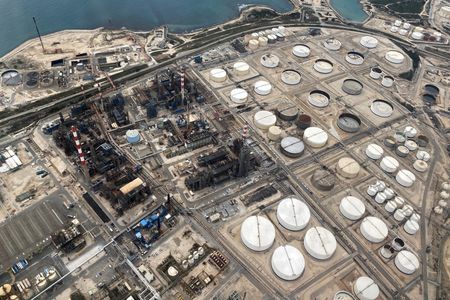
By Liz Hampton and Isabel Kua
SINGAPORE (Reuters) – Oil futures extended gains on Tuesday as the United States and Europe planned new sanctions to punish Moscow over alleged war crimes by Russian troops in Ukraine, adding to concerns about supply disruptions, while Iran nuclear talks stalled.
Brent crude futures rose $1.20, or 1.1%, to $108.73 a barrel, while U.S. West Texas Intermediate futures were up $1.25, or 1.2%, at $104.53 a barrel at 0420 GMT.
Both contracts briefly jumped more than $2 a barrel in early Asian trade after Japanese industry minister Koichi Hagiuda said the International Energy Agency (IEA) was still working out details for a planned second round of a coordinated oil releases.
Global crude futures had settled up more than 3% on Monday on the threat of more sanctions on Russia over civilian killings in Ukraine and following a pause in Vienna on talks to revive the Iran nuclear deal, which could put more Iranian barrels into the market. Iran blamed the United States for halting the talks.
“The geopolitical tension is most likely to keep the oil price gaining in the coming days despite efforts made by U.S. and allies,” said Tina Teng, a markets analyst at CMC Markets APAC & Canada, referring to the coordinated oil release by consuming countries.
“In the long run, oil prices may continue the upside momentum due to supply shortfalls and hedging demands to counter high inflation.”
Consultancy Wood Mackenzie on Monday estimated EU members and advanced economies including Japan and South Korea could “swap” some 650,000 barrels per day of Russian crude oil with similar grades and volumes. These would primarily come from Middle East volumes that are normally purchased by China and India.
India’s state run Mangalore Refinery and Petrochemicals Ltd. purchased 1 million barrels of Russian Urals for May loading, in a rare move driven by the steep discount offered.
“Global crude oil trade will rebalance by ‘crude swapping’ between ‘self-sanctioning’ advanced economies and developing markets,” said Alex Sun, a managing consultant for Wood Mackenzie, noting that a steep discount for Russian Urals barrels has created a buying opportunity for China to fill declining strategic reserves.
(Reporting by Liz Hampton in Denver and Isabel Kua in Singapore; editing by Richard Pullin)

